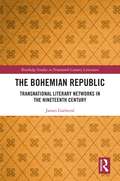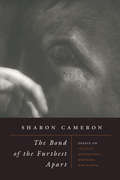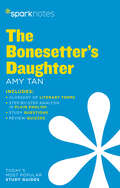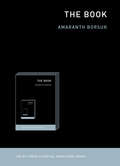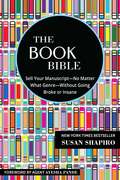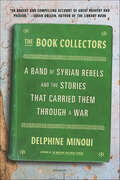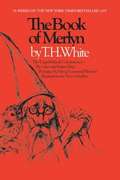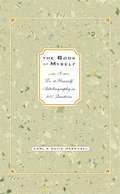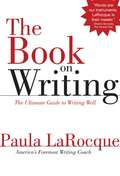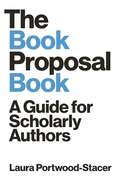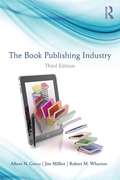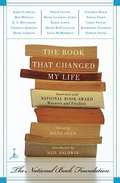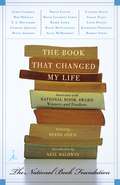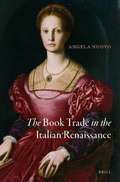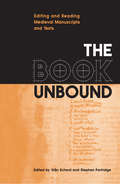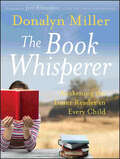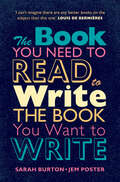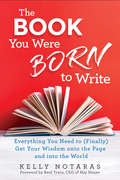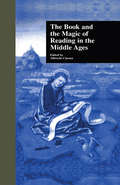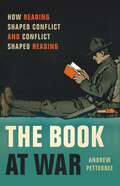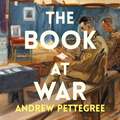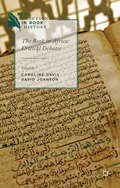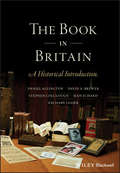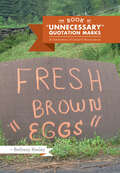- Table View
- List View
The Bohemian Republic: Transnational Literary Networks in the Nineteenth Century (Routledge Studies in Nineteenth Century Literature)
by James GatheralIn the mid-nineteenth century successive cultural Bohemias were proclaimed in Paris, London, New York, and Melbourne. Focusing on networks and borders as the central modes of analysis, this book charts for the first time Bohemia’s cross-Channel, transatlantic, and trans-Pacific migrations, locating its creative expressions and social practices within a global context of ideas and action. Though the story of Parisian Bohemia has been comprehensively told, much less is known of its Anglophone translations. The Bohemian Republic offers a radical reinterpretation of the phenomenon, as the neglected lives and works of British, Irish, American, and Australian Bohemians are reassessed, the transnational networks of Bohemia are rediscovered, the presence and influence of women in Bohemia is reclaimed, and Bohemia’s relationship with the marketplace is reconsidered. Bohemia emerges as a marginal network which exerted a paradoxically powerful influence on the development of popular culture, in the vanguard of material, social and aesthetic innovations in literature, art, journalism, and theatre. Underpinned by extensive and original archival research, the book repopulates the concept of Bohemianism with layers of the networked voices, expressions, ideas, people, places, and practices that made up its constituent social, imagined, and interpretive communities. The reader is brought closer than ever to the heart of Bohemia, a shadowy world inhabited by the rebels of the mid-nineteenth century.
The Bond of the Furthest Apart: Essays on Tolstoy, Dostoevsky, Bresson, and Kafka
by Sharon CameronIn the French filmmaker Robert Bresson’s cinematography, the linkage of fragmented, dissimilar images challenges our assumption that we know either what things are in themselves or the infinite ways in which they are entangled. The “bond” of Sharon Cameron’s title refers to the astonishing connections found both within Bresson’s films and across literary works by Tolstoy, Dostoevsky, and Kafka, whose visionary rethinkings of experience are akin to Bresson’s in their resistance to all forms of abstraction and classification that segregate aspects of reality. Whether exploring Bresson’s efforts to reassess the limits of human reason and will, Dostoevsky’s subversions of Christian conventions, Tolstoy’s incompatible beliefs about death, or Kafka’s focus on creatures neither human nor animal, Cameron illuminates how the repeated juxtaposition of disparate, even antithetical, phenomena carves out new approaches to defining the essence of being, one where the very nature of fixed categories is brought into question. An innovative look at a classic French auteur and three giants of European literature, The Bond of the Furthest Apart will interest scholars of literature, film, ethics, aesthetics, and anyone drawn to an experimental venture in critical thought.
The Bonesetter's Daughter SparkNotes Literature Guide (SparkNotes Literature Guide Series)
by SparkNotesSimplify studying with this portable literature guide, filled with resources to help you thrive in English class! The Bonesetter&’s Daughter, written by Amy Tan, depicts the fraught relationship between a Chinese immigrant and her American-born daughter. This literature guide includes a complete plot summary and analysis; key themes, motifs, and symbols; explanation of important quotes; suggested essay topics; and a review quiz. Complete Plot Summary and AnalysisKey Facts About the WorkAnalysis of Major CharactersThemes, Motifs, and SymbolsExplanation of Important QuotationsAuthor&’s Historical ContextSuggested Essay Topics25-Question Review Quiz
The Book (The MIT Press Essential Knowledge series)
by Amaranth BorsukThe book as object, as content, as idea, as interface.What is the book in a digital age? Is it a physical object containing pages encased in covers? Is it a portable device that gives us access to entire libraries? The codex, the book as bound paper sheets, emerged around 150 CE. It was preceded by clay tablets and papyrus scrolls. Are those books? In this volume in the MIT Press Essential Knowledge series, Amaranth Borsuk considers the history of the book, the future of the book, and the idea of the book. Tracing the interrelationship of form and content in the book's development, she bridges book history, book arts, and electronic literature to expand our definition of an object we thought we knew intimately.Contrary to the many reports of its death (which has been blamed at various times on newspapers, television, and e-readers), the book is alive. Despite nostalgic paeans to the codex and its printed pages, Borsuk reminds us, the term “book” commonly refers to both medium and content. And the medium has proved to be malleable. Rather than pinning our notion of the book to a single form, Borsuk argues, we should remember its long history of transformation. Considering the book as object, content, idea, and interface, she shows that the physical form of the book has always been the site of experimentation and play. Rather than creating a false dichotomy between print and digital media, we should appreciate their continuities.
The Book Bible: How to Sell Your Manuscript—No Matter What Genre—Without Going Broke or Insane
by Susan ShapiroA Brilliant, Buoyant Guide to Publishing Your Book Hundreds of thousands of books come out every year worldwide. So why not yours? In The Book Bible, New York Times bestseller and wildly popular Manhattan writing professor Susan Shapiro reveals the best and fastest ways to break into a mainstream publishing house. Unlike most writing manuals that stick to only one genre, Shapiro maps out the rules of all the sought-after, sellable categories: novels, memoirs, biography, how-to, essay collections, anthologies, humor, mystery, crime, poetry, picture books, young adult and middle grade, fiction and nonfiction. Shapiro once worried that selling 16 books in varied sub-sections made her a literary dabbler. Yet after helping her students publish many award-winning bestsellers on all shelves of the bookstore, she realized that her versatility had a huge upside. She could explain, from personal experience, the differences in making each kind of book, as well as ways to find the right genre for every project and how to craft a winning proposal or great cover letter to get a top agent and book editor to say yes. This valuable guide will teach both new and experienced scribes how to attain their dream of becoming a successful author.
The Book Collectors: A Band of Syrian Rebels and the Stories That Carried Them Through a War
by Delphine MinouiA BEST BOOK OF THE YEAR: NPR"An urgent and compelling account of great bravery and passion." —Susan OrleanAward-winning journalist Delphine Minoui recounts the true story of a band of young rebels, a besieged Syrian town, and an underground library built from the rubble of warReading is an act of resistance.Daraya is a town outside Damascus, the very spot where the Syrian Civil War began. Long a site of peacefulresistance to the Assad regimes, Daraya fell under siege in 2012. For four years, no one entered or left, and aid was blocked. Every single day, bombs fell on this place—a place of homes and families, schools and children, now emptied and broken into bits.And then a group searching for survivors stumbled upon a cache of books in the rubble. In a week, they had six thousand volumes; in a month, fifteen thousand. A sanctuary was born: a library where people could escape the blockade, a paper fortress to protect their humanity.The library offered a marvelous range of books—from Arabic poetry to American self-help, Shakespearean plays to stories of war in other times and places. The visitors shared photos and tales of their lives before the war, planned how to build a democracy, and tended the roots of their community despite shell-shocked soil. In the midst of the siege, the journalist Delphine Minoui tracked down one of the library’s founders, twenty-three-year-old Ahmad. Over text messages, WhatsApp, and Facebook, Minoui came to know the young men who gathered in the library, exchanged ideas, learned English, and imagined how to shape the future, even as bombs kept falling from above. By telling their stories, Minoui makes a far-off, complicated war immediate and reveals these young men to be everyday heroes as inspiring as the books they read. The Book Collectors is a testament to their bravery and a celebration of the power of words.
The Book No One Has Ever Read (Fountas & Pinnell LLI Purple #Level U)
by Betsy ThomasSecret Code? In the early 1900s, a very rare book was found. It was written in a secret alphabet and filled with strange drawings. If only someone could read it! What messages might be hidden in its mysterious pages?
The Book Of Merlyn
by T. H. WhiteThis magical account of King Arthur's last night on earth spent weeks on the New York Times best-seller list following its publication in 1977. Even in addressing the profound issues of war and peace, The Book of Merlyn retains the life and sparkle for which White is known. The tale brings Arthur full circle, an ending, White wrote, that "will turn my completed epic into a perfect fruit, 'rounded off and bright and done. '"
The Book Of Myself: A Do-It Yourself Autobiography in 201 Questions
by David Marshall Carl MarshallHave you ever wanted to create your own autobiography or wished you had the life stories of a relative or friend? Now beautifully revised and updated, The Book of Myself is a do-it-yourself memoir that helps you record and preserve the experiences and knowledge of a lifetime for years to come. Divided into Early, Middle, and Later Years, this keepsake volume contains 201 questions that guide you through the process of keeping memories on subjects such as family and friends, learning and education, work and responsibilities, and the world around you. Created by a grandson and grandfather, The Book of Myself is the perfect way for you, or someone close to you, to remember the turning points and everyday recollections of a lifetime and share them with future generations.
The Book On Writing: The Ultimate Guide To Writing Well
by Paula LarocqueYou're going to love the way Paula LaRocque teaches in The Book on Writing. A celebrated writing coach with a sense of humor and a gentle touch, she's also a master writer herself with a long and distinguished career in both teaching and practicing the art of writing. The Book on Writing contains 25 chapters in three sections: A dozen essential but easy-to-apply guidelines to good writing, from the importance of clarity to the value of a conversational tone. Paula LaRocque believes learning is easier and more successful when we are not only told but also shown. So her Book on Writing is chockfull of actual writing examples that supplement and illustrate principles that apply as naturally to fiction as they do to nonfiction. How to tell a story from building suspense, to effective description, to the uses of metaphor and literary devices. Paula LaRocque also deals with the narrative engine and the value of the archetype in plotting and characterization as well as with pace and speed and leveling what she terms the speedbumps in writing. A clear and concise handbook that deals with common problems in grammar, usage, punctuation, and style'the kind of problems that often trouble even wordsmiths. The handbook also debunks pesky language rules that are actually myths. The Book on Writing is one-stop shopping for writers. Read it once, and you'll be a better writer. Read it often, and you'll be among the best.
The Book Proposal Book: A Guide for Scholarly Authors (Skills for Scholars)
by Laura Portwood-StacerA step-by-step guide to crafting a compelling scholarly book proposal—and seeing your book through to successful publicationThe scholarly book proposal may be academia’s most mysterious genre. You have to write one to get published, but most scholars receive no training on how to do so—and you may have never even seen a proposal before you’re expected to produce your own. The Book Proposal Book cuts through the mystery and guides prospective authors step by step through the process of crafting a compelling proposal and pitching it to university presses and other academic publishers.Laura Portwood-Stacer, an experienced developmental editor and publishing consultant for academic authors, shows how to select the right presses to target, identify audiences and competing titles, and write a project description that will grab the attention of editors—breaking the entire process into discrete, manageable tasks. The book features over fifty time-tested tips to make your proposal stand out; sample prospectuses, a letter of inquiry, and a response to reader reports from real authors; optional worksheets and checklists; answers to dozens of the most common questions about the scholarly publishing process; and much, much more.Whether you’re hoping to publish your first book or you’re a seasoned author with an unfinished proposal languishing on your hard drive, The Book Proposal Book provides honest, empathetic, and invaluable advice on how to overcome common sticking points and get your book published. It also shows why, far from being merely a hurdle to clear, a well-conceived proposal can help lead to an outstanding book.
The Book Publishing Industry (Mass Communications Book Ser.)
by Albert N. GrecoThe Book Publishing Industry focuses on consumer books (adult, juvenile, and mass market paperbacks) and reviews all major book categories to present a comprehensive overview of this diverse business. In addition to the insights and portrayals of the U.S. publishing industry, this book includes an appendix containing historical data on the industry from 1946 to the end of the twentieth century. The selective bibliography includes the latest literature, including works in marketing and economics that has a direct relationship with this dynamic industry. This third edition features a chapter on e-books and provides an overview of the current shift toward digital media in the US book publishing industry.
The Book That Changed My Life: Interviews with National Book Award Winners and Finalists
by Diane OsenEvery reader can name at least one book that changed his or her life. In The Book That Changed My Life, fifteen of America's most influential authors discuss their own special literary choices. These unique interviews with National Book Award winners and finalists offer new insights into the many ways in which the experience of reading shapes the act of writing. Robert Stone on Joseph Conrad's Victory, Cynthia Ozick on Henry James's Washington Square, Charles Johnson on Jack London's The Sea-Wolf-- each approaches the question of literary influence, while offering rich and wonderful revelations about his or her own writing career.
The Book That Changed My Life: Interviews with National Book Award Winners and Finalists
by Neil Baldwin Diane OsenEvery reader can name at least one book that changed his or her life--and many more beloved titles will surely come to mind as well. In The Book That Changed My Life, fifteen of America's most influential authors discuss their own special literary choices. These unique interviews with National Book Award winners and finalists offer new insights into the many ways in which the experience of reading shapes the act of writing. Robert Stone on Joseph Conrad's Victory, Cynthia Ozick on Henry James's Washington Square, Charles Johnson on Jack London's The Sea-Wolf--each approaches the question of literary influence, while offering rich and wonderful revelations about his or her own writing career. James Carroll, Don DeLillo, E. L. Doctorow, Diane Johnson, Philip Levine, David Levering Lewis, Barry Lopez, David McCullough, Alice McDermott, Grace Paley, Linda Pastan, and Katherine Paterson are the other distinguished contributors to this collection of informed, insightful interviews.From the Trade Paperback edition.
The Book Trade In The Italian Renaissance
by Angela NuovoThis work offers the first English-language survey of the book industry in Renaissance Italy. Where traditional accounts of the book in the Renaissance celebrate authors and literary achievement, this study examines the nuts and bolts of a rapidly expanding trade that built on existing economic practices while developing new mechanisms in response to political and religious realities. <p><p> Approaching the book trade from the perspective of its publishers and booksellers, this archive-based account ranges across family ambitions and warehouse fires to publishers' petitions and convivial bookshop conversation. In the process it constructs a nuanced picture of trading networks, production, and the distribution and sale of printed books, a profitable but capricious commodity.
The Book Unbound: Editing and Reading Medieval Manuscripts and Texts
by Siân EchardIn The Book Unbound, scholars and editors examine how best to use new technological tools and new methodologies with artifacts of medieval literature and culture. Taking into consideration English, French, Anglo-Norman, and Latin texts from several periods, the contributors examine and re-evaluate traditional approaches to and conclusions about medieval books and the cultural texts they contain - literary, dramatic, legal, historical, and musical. The essays range from detailed examinations of specific codices to broader theoretical discussions on past and present editorial practices, from the benefits and disadvantages of digital editions versus print editions to the importance of including 'extratextual' material such as variant texts, illustrations, intertexts, and other information about a work's cultural contexts, history, and use. The Book Unbound presents important contributions to the discussions surrounding the editing of medieval texts, including the use of digital technology with historical and literary documents, while offering practical ideas on editing print and hypertext. The collection will be invaluable to historians, literary scholars, and editors.
The Book Whisperer
by Jeff Anderson Donalyn MillerDonalyn Miller says she has yet to meet a child she couldn't turn into a reader. No matter how far behind Miller's students might be when they reach her 6th grade classroom, they end up reading an average of 40 to 50 books a year. Miller's unconventional approach dispenses with drills and worksheets that make reading a chore. Instead, she helps students navigate the world of literature and gives them time to read books they pick out themselves. Her love of books and teaching is both infectious and inspiring. The book includes a dynamite list of recommended "kid lit" that helps parents and teachers find the books that students really like to read.
The Book You Need to Read to Write the Book You Want to Write: A Handbook for Fiction Writers
by Jem Poster Sarah BurtonHave you ever wanted to write a novel or short story but didn't know where to start? If so, this is the book for you. It's the book for anyone, in fact, who wants to write to their full potential. Practical and jargon-free, rejecting prescriptive templates and formulae, it's a storehouse of ideas and advice on a range of relevant subjects, from boosting self-motivation and confidence to approaching agents and publishers. Drawing on the authors' extensive experience as successful writers and inspiring teachers, it will guide you through such essentials as the interplay of memory and imagination; plotting your story; the creation of convincing characters; the uses of description; the pleasures and pitfalls of research; and the editing process. The book's primary aim is simple: to help its readers to become better writers.
The Book You Were Born to Write: Everything You Need to (Finally) Get Your Wisdom onto the Page and into the World
by Kelly NotarasA guide to writing a full-length transformational nonfiction book, from an editor with two decades' experience working with authors from all walks of life."I know I have a book in me.""I've always wanted to be an author.""People always ask me when I'm going to write my book.""I have a story to tell, but I never seem to make time to write."These are just a sampling of the messages Kelly Notaras hears every day from would-be authors around the globe. Life coaches with new methodologies for living on purpose . . . energy workers who've discovered new ways to prevent disease and teach self-healing . . . everyday heroes and heroines who have made it through difficult circumstances and want to inspire others to do the same. In today's tumultuous world, we need these voices in the marketplace. Moreover, publishing a book has never been so simple, accessible, or affordable as it is today. So why are so many thought leaders, healers, and change-agents stuck at the starting line?This book will light the way--offering a simple, step-by-step path that takes authors from concept to finished book. In it, publishing veteran Kelly Notaras demystifies the publishing process and gives writers the tools, insider information, and inspiration to start strong, keep going, and get across the finish line as quickly as possible.
The Book and the Magic of Reading in the Middle Ages (Garland Medieval Casebooks #24)
by Albrecht ClassenThe computer revolution is upon us. The future of books and of reading are debated. Will there be books in the next millennium? Will we still be reading? As uncertain as the answers to these questions might be, as clear is the message about the value of the book expressed by medieval writers. The contributors to the volume The Book and the Magic of Reading in the Middle Ages explore the significance of the written document as the key icon of a whole era. Both philosophers and artists, both poets and clerics wholeheartedly subscribed to the notion that reading and writing represented essential epistemological tools for spiritual, political, religious, and philosophical quests. To gain a deeper understanding of the cultural significance of the medieval book, the contributors to this volume examine pertinent statements by medieval philosophers and French, German, English, Spanish, and Italian poets.
The Book at War: How Reading Shaped Conflict and Conflict Shaped Reading
by Andrew PettegreeA "magisterial" (Sunday Times) illumination of how books were used in war across the twentieth century—both as weapons and as agents for peace We tend not to talk about books and war in the same breath—one ranks among humanity&’s greatest inventions, the other among its most terrible. But as esteemed literary historian Andrew Pettegree demonstrates, the two are deeply intertwined. The Book at War explores the various roles that books have played in conflicts throughout the globe. Winston Churchill used a travel guide to plan the invasion of Norway, lonely families turned to libraries while their loved ones were fighting in the trenches, and during the Cold War both sides used books to spread their visions of how the world should be run. As solace or instruction manual, as critique or propaganda, books have shaped modern military history—for both good and ill. With precise historical analysis and sparkling prose, The Book at War accounts for the power—and the ambivalence—of words at war.
The Book at War: Libraries and Readers in an Age of Conflict
by Andrew PettegreeChairman Mao was a librarian. Stalin was a published poet. Evelyn Waugh served as a commando - before leaving to write Brideshead Revisited. Since the advent of modern warfare, books have all too often found themselves on the frontline.In The Book at War, acclaimed historian Andrew Pettegree traces the surprising ways in which written culture - from travel guides and scientific papers to Biggles and Anne Frank - has shaped, and been shaped, by the conflicts of the modern age. From the American Civil War to the invasion of Ukraine, books, authors and readershave gone to war - and in the process become both deadly weapons and our most persuasive arguments for peace
The Book in Africa
by David Johnson Caroline DavisThis volume presents new research and critical debates in African book history, and brings together a range of disciplinary perspectives by leading scholars in the subject. It includes case studies from across Africa, ranging from third-century manuscript traditions to twenty-first century internet communications.
The Book in Britain: A Historical Introduction
by Daniel Allington David A. Brewer Stephen Colclough Sian EchardIntroduces readers to the history of books in Britain—their significance, influence, and current and future status Presented as a comprehensive, up-to-date narrative, The Book in Britain: A Historical Introduction explores the impact of books, manuscripts, and other kinds of material texts on the cultures and societies of the British Isles. The text clearly explains the technicalities of printing and publishing and discusses the formal elements of books and manuscripts, which are necessary to facilitate an understanding of that impact. This collaboratively authored narrative history combines the knowledge and expertise of five scholars who seek to answer questions such as: How does the material form of a text affect its meaning? How do books shape political and religious movements? How have the economics of the book trade and copyright shaped the literary canon? Who has been included in and excluded from the world of books, and why? The Book in Britain: A Historical Introduction will appeal to all scholars, students, and historians interested in the written word and its continued production and presentation.
The Book of "Unnecessary" Quotation Marks: A Celebration of Creative Punctuation
by Bethany KeeleyFrom the popular blog, a hilarious and horrifying survey of quotation mark abuse in all its forms.From the sarcastic to the suggestive, here are quotation marks as we love them best, doing horrible damage to the English language. Who wouldn’t have second thoughts about ordering the “hamburger” on the diner’s menu? Would it be best to skip the “blowout” sale at the department store? What hidden price must be paid for something marked “free”? Assembled by the creator of the wildly popular “Blog” of “Unnecessary” Quotation Marks, this book surveys the havoc wreaked by quotation marks on signs, menus, placards, and posters that leave reality upended by supposed “facts.” This smarty-pants guide is “perfect” for desperate grammarians, habitual air quoters, and anyone who appreciates a good laugh.
